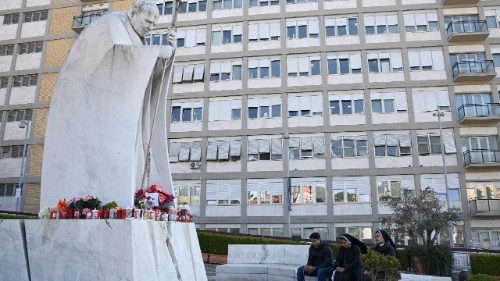The profile of the businessman from the perspective of the Social Doctrine of the Church
When style is more important than method

The Social Doctrine of the Church, that is, the reflection and contribution of the Magisterium on the “Social Question” constitutes a rich source of knowledge that, like good wine, has the quality of years of experience and life. Countless quotes address the broad subject that encompasses “man in society” and, therefore, the business reality.
In the age of technology, the profile has become our first letter of introduction. We talk about a professional profile, our profiles on social networks, the profiles of the candidates we are looking for, … The profile outlines the fundamental, even identity-based, features that we intend to highlight.
But what is the profile of a businessman and a manager from the perspective of the Social Doctrine of the Church? For Christians, this profile takes on a vocational dimension, because it implies the response, as believers, to the call of God who invites us to be, through our managerial tasks, instruments of social transformation. Pope Francis already stressed:
“The vocation of an entrepreneur is a noble task, provided that it allows itself to be challenged by a broader sense of life; this allows it to truly serve the common good, with its effort to multiply and make more accessible to all the goods of this world” (Evangelii gaudium 203)
Some aspects that could configure this profile of the entrepreneur would be:
1.- The entrepreneur must be an expert in the achievement of benefits and objectives. John Paul II expounded this idea in a masterful way in the face of the risks of a reductionist conception of profit:
“The Church recognizes the just function of profits, as an index of the good progress of the company. When a company makes a profit, it means that the productive factors have been adequately used and that the corresponding human needs have been duly satisfied. However, profits are not the only indicator of the company’s conditions. It is possible for the financial statements to be correct and at the same time for the people, who constitute the company’s most valuable asset, to be humiliated and have their dignity insulted. Besides being morally unacceptable, this cannot but have negative repercussions for the future, even for the economic efficiency of the company” (Centesimus annus 35)
2.- The entrepreneur must be a person capable of guaranteeing the necessary unity of collaboration to develop an efficient management, which is so to the extent that he makes use of the experience of his collaborators. This is what John XXIII proposes:
“A conception of the company that wants to safeguard human dignity must, without a doubt, guarantee the necessary unity of an efficient management; But it does not follow from this that he can reduce his daily collaborators to the condition of mere silent executors, without any possibility of making use of their experience, and entirely passive as regards the decisions that concern hiring and regulating their work” (Mater et Magistra 92).
3.- The entrepreneur must be capable of assuming the responsibility that concerns him as a transformer of society. On June 8, 1964, Pope Paul VI addressed the members of the Christian Union of Entrepreneurs and Managers (UCID) in these terms: “You are, together with teachers and doctors, the principal transformers of society.”
4.- Capacity for fair management. The fair entrepreneur remunerates workers fairly. For John Paul II this is an ethical question:
“The key problem of social ethics is that of fair remuneration for work performed. In the current context, there is no better way to achieve justice in employee-employer relations than through remuneration for work” (Laborem exercens 19).
5.- Diligence, industry and prudence in assuming reasonable risks. Risk is part of the life of the company, and this risk must be managed based on Christian virtues. John Paul II refers to the virtues that support those companies that really transform social and personal reality:
“In this process, important virtues are involved, such as diligence, industry, prudence in assuming reasonable risks, reliability and loyalty in interpersonal relationships, resolution of mind in carrying out difficult and painful decisions, but necessary for the common work of the company and to face eventual setbacks of fortune” (Centesimus annus 32).
6.- Architect of solidarity, dignity and the common good. The Christian businessman and manager takes on the challenge of making the social function of the company visible. Pope Francis establishes a direct and binding relationship between economic activity and the social function in the company when he stresses that “without internal forms of solidarity and mutual trust, the market cannot fully fulfil its proper economic function” (Fratelli Tutti 168). Thus, the option for a more fraternal world, more respectful of the dignity of people and more aligned with the common good, is not a “plus” in the company, but is part of its DNA.
In short, the Christian businessman is aware that achieving profits and objectives is not incompatible with the development of ethical principles in the company. This conviction means that the greatness of the Christian businessman and manager is hidden in a style rather than in a methodology.
Dionisio Blasco España is Territorial Delegate in the Diocese of Malaga and member of the Executive Committee of Corporate Social Action
Related

Pope Francis spent a peaceful night
Exaudi Staff
02 March, 2025
1 min

Pope Francis has had a peaceful night
Exaudi Staff
25 February, 2025
1 min

What should the boyfriend or girlfriend I should find be like?
Patricia Jiménez Ramírez
24 February, 2025
4 min

The Pope spent a quiet night at Gemelli
Exaudi Staff
23 February, 2025
1 min
 (EN)
(EN)
 (ES)
(ES)
 (IT)
(IT)

